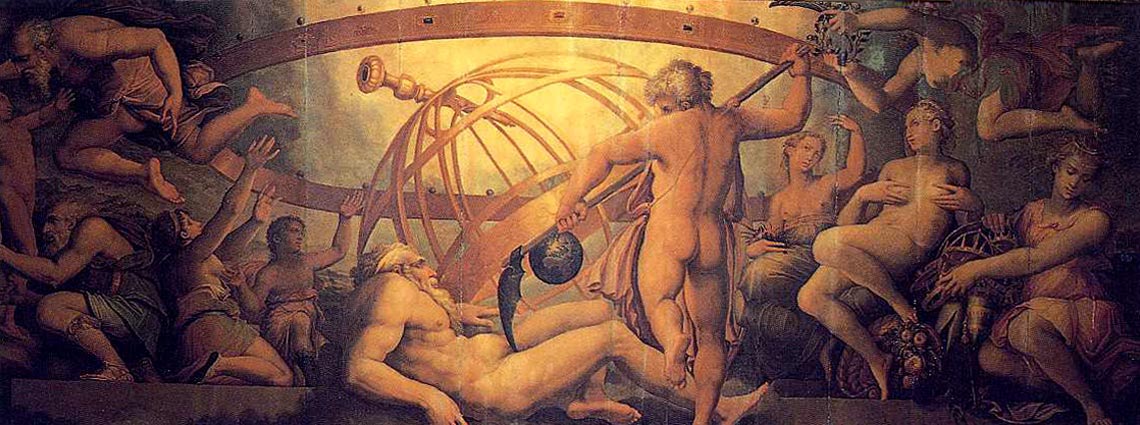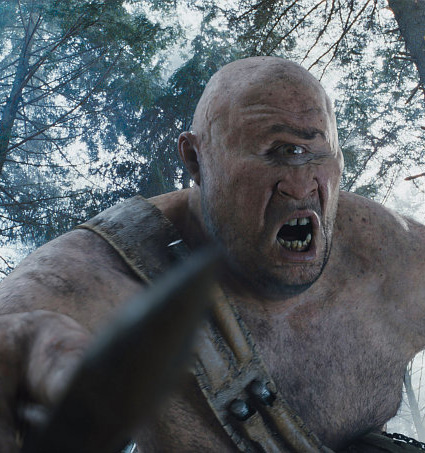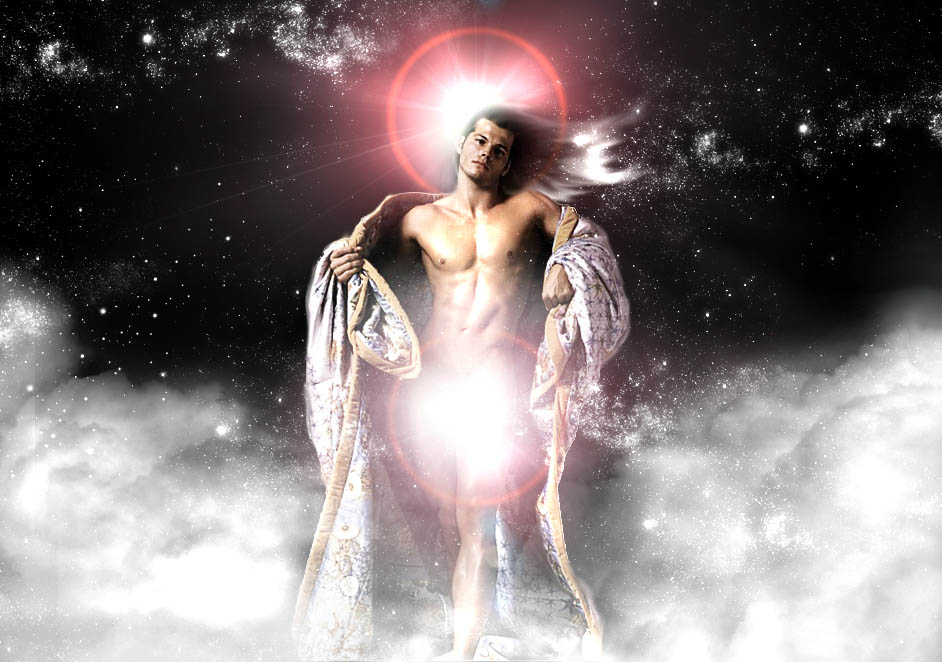OLYMPUS!


The world of the Ancient Greeks was dangerous yet available to a certain kind of manipulation. It was known that a safe voyage could be guaranteed, or a healthy birth assured, by precautionary rituals of sacrifice and worship to honor or cajole the heavenly powers. The deities were eminently susceptible to such attentions, for they themselves were men and women, with features and characters as clearly defined as any mortal hero’s. Through their ranks rode the full cavalcade of human virtues, vices, ambitions and desires. Their family tree was intricate and indeed incestuous.
It was plain to every Greek that all the gods were fallible. At root, their authority was undermined by the savage history of their rise to power. The story of the celestial revolution had its beginning in the place where time itself had not even been born. Here, brooding in the infinite darkness, was Chaos.
How Chaos sprung into being mortals could never fathom, but it was known that out of Chaos came Gaea - Earth, the warm fertile mother of creation. From Gaea was born Uranus, the vast canopy of the sky, crowned with stars. Gaea’s equal in majesty, Uranus became not only son but husband. Their union bore many children: first, the Titans, six male and six female giants, the first mortal race to people the universe, next, the Cyclopes, as mighty in bearing as their siblings, but each with only one eye glaring from the center of his forehead, finally the Hecatoncheires, three grotesquely deformed monsters , each with a hundred arms and fifty heads.

Uranus witnessed the births of each of his progeny with increasing horror. He became possessed by the conviction that these brutish children would one day rise up and murder him. Even as they struggled, fully grown, from Gaea’s womb, he grabbed them and flung them into a deep, jagged pit where he left them to die. Gaea wailed her sorrow to the skies. Monsters they may have been, but her maternal feelings extended even to the most grotesque.
Her misery festered into desire for revenge. Drawing from the secret reaches of her heart, a river of bright boiling metal, Gaea forged a sickle that was strong enough to raze a mountain. She descended to the pit where her children languished and showed them the weapon. She asked which one of them would care to wield the blade against their evil parent. Of all their number, only Chronus the Titan, raised his hand.

That night, as Uranus lay sprawled beside Gaea, deep in sleep, Chronus smuggled from the chasm and lying hidden in the copious fold of his mother’s body crept out. He snatched up the sickle and with one stroke hacked off the sky-god’s genitals and flung them into the sea. As Uranus screamed, a torrent of black blood erupted from his wound. Where it fell, the ground, split open and threw up a horde of giants, and at their side, the Furies- evermore to be the persecutors of offending mortals. The severed pieces of Uranus’ body floating in a bloody spume at the ocean edge, burst into brilliant foam. A female figure appeared riding the crest of the breaker as it cascaded to the shore. In this way did Aphrodite, the goddess of love come into the world.

With Uranus crippled, and useless, the universe lay at Chronus’ feet. At once he returned to the chasm and set free his brothers and sisters, the Titans. The Cyclopes and Hecatoncheires he unwisely left behind in the dark. Now Chronus the usurper, continued the task of creation. He took as his bride his sister Rhea, and together they produced two sons, Hades and Poseidon and three daughters, Demeter, Hera and Hestia.
But the wheel of fortune ground its inexorable course. Chronus looked at his children and was afraid. Why should they not do what he had done to his father, Uranus? In a torment of fear and anger, Cronus tore Hades and Poseidon from their mother’s breast and swallowed them alive. Rhea gave birth to her next child in a secret place, then returned home and docilely offered Chronus something swaddled in a blanket. Without hesitation, Chronus snatched the bundle and swallowed it. But this time the devious Chronus was himself deceived. A smooth stone now lay in Chronus’ belly, while Zeus, the son of Rhea, was saved. The infant god was handed by his grandmother Gaea into the care of the Curetes, the high priests of Crete. He grew to maturity unmolested.
One afternoon, a hooded sibyl came to Chronus offering auguries. The warning froze his blood … he destined to be murdered by one of his own sons. Yet all of them he knew to be devoured. Scowling, he summoned his handmaiden, the reticent young goddess Metis to bring him a soothing drink.And in so doing, he gave a helping hand to fate. For Zeus, now grown to manhood, was Metis’ paramour, and with his collusion the drink had been drugged. Chronus began vomiting and from the gorge hurtled up all those he had swallowed up: Demeter, Hera, Hestia, Hades and Poseidon – wretched and bewildered but unharmed by their ordeal. Weak with Nausea and fear, Chronus was no match for Zeus and his siblings. The broken Titan was hauled out of the sky and riveted to a boulder beneath the sea bed , doomed to weep away eternity.
Zeus immediately began to consolidate his position before the Titans could rally and attack him. Choosing Mount Olympus for the center of his command, he drew about him a company of immortals to defend the craggy stronghold. The onslaught, when it came, was cataclysmic. For ten years the Titans bombarded Olympus without a second’s respite; for ten years the rebels held their ground. At last seeing no end to this war of attrition, Zeus plunged into Tarturus, the grisliest dungeon of Hell, and freed the Cyclopes and Hecatoncheires. Prisoners first of Uranus, then Chronus, then long forgotten, they owned alliegiance to Zeus, their deliverer, and not to their brothers the Titans.


With the Hecatonchieres and Cyclopes behind him, Zeus was equipped to devastate his enemies. Standing aside Mount Olympus, he hurled thunderbolt after thunderbolt , until the rocks beneath the Titans’ feet boiled into bubbling paste and the sea itself was aflame. Only then did they surrender. Zeus bound the Titans with massive chains, dragged down to the bowels of the earth and entombed them there. After the victory against the gods who preceded them, Zeus, Hades and Poseidon cast lots to determine the territory each would rule.
And thus the myth and legend continues …

RESOURCE: Gods and Goddesses, The Enchanted World, Time Life Books